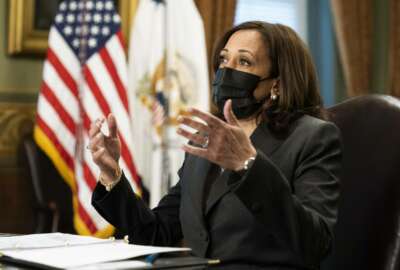Possible vaccine mandate for federal employees raises host of tricky questions, attorneys say
Federal employees may soon face a new vaccine mandate, or at least stricter requirements from the Biden administration. Guidance on the legality of vaccine mandates...
The tide may be shifting on COVID-19 vaccines for the federal workforce.
President Joe Biden said Tuesday a vaccine mandate for federal employees was “under consideration,” a day after the Department of Veterans Affairs announced new requirements for its health care workforce.
And the White House is reportedly considering new rules for federal employees that require them to show proof of vaccination or face regular testing, a significant policy shift for the administration. Biden is expected to make an announcement as early as Thursday.
The potential for a vaccine mandate was met with apprehension from at least two federal employee groups on Wednesday, including the Professional Managers Association, which represents supervisors at the IRS, and the Federal Law Enforcement Officers Association. Both organizations said they support incentivizing employees to get vaccinated, but not a mandate.
“Forcing people to undertake a medical procedure is not the American way and is a clear civil rights violation no matter how proponents may seek to justify it,” Larry Cosme, FLEOA president, said in a statement.
The legality of vaccine mandates is clear, federal employment attorneys said, but implementing them unleashes a whole host of potentially thorny questions for both employees and their agencies.
“I anticipate there will be challenges; there always are,” said Deborah Hopkins, an attorney and president of the Federal Employment Law Training Group, which offers instructional courses on employee discipline, misconduct, accommodations and other topics. “But we have very clear guidance from the government about the legality of mandates for the vaccine.”
According to May guidance from the Equal Employment Opportunity Commission, federal EEO laws don’t prohibit an employer from requiring all employees who physically enter a workplace to be vaccinated against COVID-19.
And in a legal opinion posted to its website earlier this week, the Justice Department’s Office of Legal Counsel said the Federal Food, Drug and Cosmetic Act doesn’t prohibit public or private sector employers from imposing vaccine mandates on their employees — even if they’ve been issued under an “emergency use authorization” from the Food and Drug Administration.
Legal challenges over a strict vaccine mandate for federal employees aren’t likely to go very far, and constitutional arguments over them often fail, said Debra D’Agostino, a founding partner at the Federal Practice Group.
“You still have a choice, but there’s a secondary consequence,” she said of employer-directed vaccine mandates. “If you choose not to get the vaccine, then you might not be able to keep your job, you might not be able to go to school. That’s the choice you get to make: you get to choose vaccine or job. That’s why it’s not an unconstitutional mandate, because the person still has the choice.”
The courts have often sided with employers on vaccine requirements, including in cases with federal agencies.
D’Agostino pointed to a 2002 case, where the U.S. Court of Appeals for the Federal Circuit upheld the Navy’s decision to fire two civilian employees who refused the anthrax vaccine before a deployment on a naval ship to Korea.
In Mazares v. Department of the Navy, the civilian mariners argued the vaccine order was unauthorized and that their firings were excessive.
The court sided with the Navy, as well as the Merit Systems Protection Board administrative judge who first heard the employees’ appeal. Removal was not authorized or excessive, the court said, and the employees were fired because they failed to obey a direct order.
“That misconduct constituted insubordination, which this court defines as a ‘willful and intentional refusal to obey an authorized order of a superior officer which the officer is entitled to have obeyed,'” the decision reads. “Insubordination is a serious offense that disrupts the work place and interferes with and threatens the ability of the work force to perform its duties. Its adverse impact is particularly serious in the military, where prompt obedience to lawful orders is essential, especially aboard a ship.”
Prepare for reasonable accommodations, possible discipline
The federal workforce will also have a choice if, as reports suggest, the government allows employees to choose the vaccine or face rigorous testing and other safety requirements.
“For each employee, the agencies are going to have to assess whether the employee who’s not vaccinated poses a direct threat to other employees or to the public,” D’Agostino said. “That’s going to have to be the first step. If the answer is no to that, I suspect there’s going to be some leniency built in, where the agency is not going to have to fire someone for failing to obey an order or a mandate because that person is not creating a direct threat.”
A strict vaccine mandate will unleash a wave of unreasonable accommodations for medical or religious reasons from federal employees, the attorneys said.
Those requests for accommodations may get more complex if the Biden administration allows employees to choose between vaccination and more rigorous testing.
“Then the requests we’ll see for reasonable accommodation exemptions, whether it’s disability or religious, might be a little more challenging,” Hopkins said. “I suppose people with medical conditions, where wearing a mask — someone with asthma, for example, who has a harder time breathing — might request to telework or to not have to wear a mask in the workplace.”
Employees who don’t comply — with a vaccine mandate, requests for testing and masking or any accommodations — will likely face disciplinary action, attorneys say.
“Let’s assume… an employee doesn’t want to get vaccinated or reveal their vaccination status, doesn’t want to wear a mask and doesn’t want to submit to testing, then it’s a conduct issue,” Hopkins said. “The employee could be disciplined, up to and including removal. We’ll probably see some of that, or maybe people will quit.”
For those who may refuse vaccination or a testing regime, agencies will need to be careful in applying discipline to employees, D’Agostino said.
Employees without a reasonable accommodation who refuse vaccination in one part of an agency should be treated in the same way as another employee in a similar situation.
“Due process rights aren’t going to disappear just because there’s a vaccine mandate,” D’Agostino said. “A vaccine mandate is going to be like any other order that an agency issues. Failure to obey an order or insubordination can come with a variety of consequences. What’s going to be important is consistency.”
While the prospects of a vaccine mandate for the federal workforce may seem like new territory — the Biden administration didn’t publicly express an interest in such requirements until this week — Hopkins said agencies are well-versed in applying standard rules on reasonable accommodations and employee discipline.
“The framework of the law remains the same,” she said. “The facts are just new and different over the last year-and-a-half with this pandemic.”
Potential vaccine requirements raise dozens of questions
Still, implementing and enforcing a vaccine mandate on federal employees and contractors will be incredibly difficult, attorneys and experts said.
Any new rules raise questions about the impact on the contracting community.
“You have to include contractors in any mandate,” said David Berteau, president and CEO of the Professional Services Council. “Epidemiologically, it doesn’t make sense to require some people who are sitting in an office to be vaccinated and not others.”
The task of communicating the details of a vaccine mandate to federal contractors — who specifically it applies to and how exceptions will be made — will be a challenge.
“Typically, guidance to federal civilian employees is centralized from OMB and OPM out to the agencies through their chains of command, but guidance to contracting officers is often one contract at a time,” Berteau said. “There are hundreds of thousands of active contracts, or millions depending on how you count them, by task order or by full contract. You can’t let that guidance be done one contract at a time. There has to be a universal approach or it won’t make sense from a medical or a health point of view, as well as a citizen service point of view.”
The prospect of mandatory testing for employees and contractors who refuse vaccination poses questions about how agencies will collect and store that information — and how they’ll pay for it.
A potential vaccine mandate also raises many questions about how agencies will collect, verify and secure those details from their employees.
Prior guidance from the Safer Federal Workforce Task Force said agencies can’t compel their employees to disclose their vaccination status, and some agencies have told their supervisors not to ask.
The Rehabilitation Act requires agencies to keep medical information confidential, and an employee’s vaccination status falls into that category, D’Agostino said.
“Asking is not in itself considered a disability-related inquiry that’s in violation of any law, so agencies can ask,” she said. “If an employee discloses, that answer must be kept confidential, like any other confidential medical information an agency would have. If an employee refuses to respond, then agencies should treat that employee as though that employee is not vaccinated.”
Copyright © 2025 Federal News Network. All rights reserved. This website is not intended for users located within the European Economic Area.
Nicole Ogrysko is a reporter for Federal News Network focusing on the federal workforce and federal pay and benefits.
Follow @nogryskoWFED






